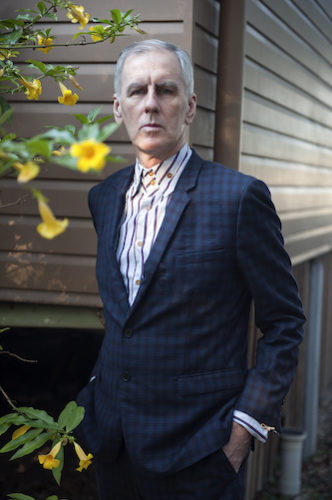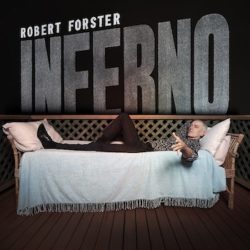Music Interview: Musician and Writer Robert Forster — Life Before and After The Go-Betweens
By Blake Maddux
Robert Forster was apparently spot-on when he proclaimed that The Go-Betweens “were too good for the bloody charts.”
Robert Forster at City Winery. 80 Beverly St., Boston. Thursday, November 14. Doors at 6, show at 8. $20-$25

Robert Forster photographed in Caloundra, Queensland, on 26 September 2018 by Bleddyn Butcher.
“We never got anywhere near a chart,” wrote Robert Forster in the liner notes to a 1999 best-of compilation by the band he cofounded, The Go-Betweens.
This was despite the fact that Forster and songwriting partner Grant McLennan recorded six albums’ worth of some of the smartest and most critically lauded indie pop of the 1980s. Forster and McLennan’s solo albums met similar commercial and critical fates in the 1990s, as did the three albums that were released between the band’s 2000 reunion and the latter’s death in 2006.
And yet, there remains enough interest in The Go-Betweens that since 2015 they have been the subject of two lavish box sets (G Stands for Go-Betweens: Volume 1, 1978-1984 and the imminently forthcoming Volume 2, 1985-1989), an acclaimed book by Forster (Grant and I: Inside and Outside the Go-Betweens), and a documentary (The Go-Betweens: Right Here).
Oh yeah, and a new structure spanning the Brisbane River in the band’s Australian hometown was christened Go Between Bridge in 2010.
Forster was apparently spot-on when he proclaimed, also in the aforementioned liner notes, “we were too good for the bloody charts.”
In the decade that followed the final Go-Betweens album (2005’s Oceans Apart), Forster carved out a second career as a rock and pop journalist for the Melbourne-based magazine The Monthly. In 2006, his first full year at the publication, he was the recipient of the prestigious Pascall Prize for Australian Critic of the Year. His writings were compiled in the 2009 anthology The 10 Rules of Rock and Roll, which was soon updated to include his 2010-11 work.
The now 62-year-old singer-songwriter released his third solo album of the millennium, Inferno, in March. Its nine tracks range from poetic (“Crazy Jane on the Day of Judgement”), plaintive (“No Fame,” “Remain,” “One Bird in the Sky”), and rollicking (“Inferno”).
On November 14, he will perform at City Winery after spending a day off in Boston following a date in Toronto.
He spoke to The Arts Fuse via Skype from his home in Brisbane.

The Arts Fuse: How long has it been since you toured the United States?
Robert Forster: 11 years. I can’t wait to get there. I’m going over there with my songs, and I almost can’t imagine what’s gonna happen. Whatever good things happen will be a bonus and I know there’s people who want to see me play. So I’m looking forward to being there.
AF: What do you most closely associate with Boston in terms of its music and history?
RF: Well one of my favorite all-time rock bands come from there, which is The Modern Lovers. I love the sound of the band and the songwriting and voice of Jonathan Richman. That was a very important part of my musical development. And I’ve followed Jonathan’s songwriting and music since. And also I have an interest in poetry, so people like Anne Sexton and Sylvia Plath and Robert Lowell. Boston was a place that they worked and traveled through and lived. So that has meaning to me. And also the Cambridge folk scene from the early 60s – like Eric Von Schmidt and all those people that came through – is something that I’ve always been very interested in and liked a great deal. So there are many things associated with Boston that I like.
AF: What do you find most satisfying about Inferno?
RF: The sound of it. That was working with Victor Van Vugt, who I worked with before and who’s made many fine records in his time. And I just think he did an amazing job with the sounds of the instruments and particularly the sound of my voice. The mixture that he’s done between voice and instrumentation, that to me is a big thing. Because almost record to record, my songwriting is a constant and so whatever changes come are often to do with the sound of the record, where I’m recording it, the musicians. So this time the sound was a big thing for me.
AF: How did you end up reuniting with Van Vugt for this album?
RF: He engineered an album that I did in 1990 called Danger in the Past, and I always liked what he did with that record and what he’s done with other records that he’s been involved with. He was living in New York for many years, from the late ’90s to about 2014 or something like that. When he moved to Berlin, it just made things a little more practical. I just knew that Victor would really do good things with the songs. Also, it must be noted, he’s a very nice person. He’s a very easy person to work with. It’s a very good, enthusiastic, straightforward process in the recording studio. You’re not working with a tortured genius, thank goodness!
AF: Were all of the songs written specifically for Inferno or had some been kicking around for a while?
RF: Two songs, “Life Has Turned a Page” and “I’m Gonna Tell It,” I had recorded for the last album that I did. These were pre-2014. And I loved the songs and I just wasn’t happy with the way they were recorded. We had enough songs anyway for the album called Songs to Play. I was happy with what we had, and I immediately thought that I would hold on to “Life Has Turned a Page” and “I’m Gonna Tell It” till the next record.
Songs come constantly very slowly, and so I’m not really in a position where I can just discard two really good songs. I just can’t do that. The other seven [on Inferno] were written from 2015 onwards. I haven’t got 20 songs for every record and then there’s 10 lying around in demo versions. I’m not someone like Radiohead or Wilco.
AF: It must have been challenging to put William Butler Yeats’s poem “Crazy Jane on the Day of Judgment” to music. What inspired you to do so?
RF: I was asked by some people in Ireland who were putting on a concert at this big venue in Dublin to celebrate the 150th anniversary of the birth of William Butler Yeats. This was in early 2015, and they were inviting songwriters and musicians from around the world. They sent me these poems, and you’re right, William Butler Yeats’s work is very hard to put to any type of pop music. But I’d just written this melody and I didn’t have a lyric for it and it just fit almost perfectly. So I went over to Dublin and we performed this song in this concert hall and I liked it so much that I kept it for the album. It wasn’t something where I deliberately decided to put music to a piece of poetry. It was a project that was offered to me.
AF: How did “Go Between Bridge” become the ultimately successful contender for the name of a bridge in Brisbane?
RF: I don’t know, Blake. I don’t know how that happened. I think it was people putting it forward. It was all done for a newspaper. It was sort of a popular vote. I didn’t even know it was going on. Some people put it up as an idea, and I think the other ideas were maybe unknown or bland or boring or whatever and people wanted something different for their infrastructure. And so the Go Between Bridge came through. It was democracy in action, and I’m very, very happy with the result.
AF: While there were surely any number of reasons to do so, what was your primary motivation for writing Grant & I: Inside and Outside the Go-Betweens?
RF: Before Grant passed away in 2006, I had no intention of writing a book. Or if I did, it was to write a novel. That was probably my dream. But when he passed away it just came quickly. It was immediately there that I wanted to tell our story. It was a lot of work. It’s probably the most concentrated, time-consuming thing that I’ve ever done, and I’m very, very happy that I put in all that time for it. The subject matter demanded it and I wanted to do a very thorough job with it.
Blake Maddux is a freelance journalist who regularly contributes to the Arts Fuse, the Somerville Times, and the Beverly Citizen. He has also written for DigBoston, the ARTery, Lynn Happens, the Providence Journal, The Onion’s A.V. Club, and the Columbus Dispatch. A native Ohioan, he moved to Boston in 2002 and currently lives with his wife and one-year-old twins–Elliot Samuel and Xander Jackson–in Salem, Massachusetts.
